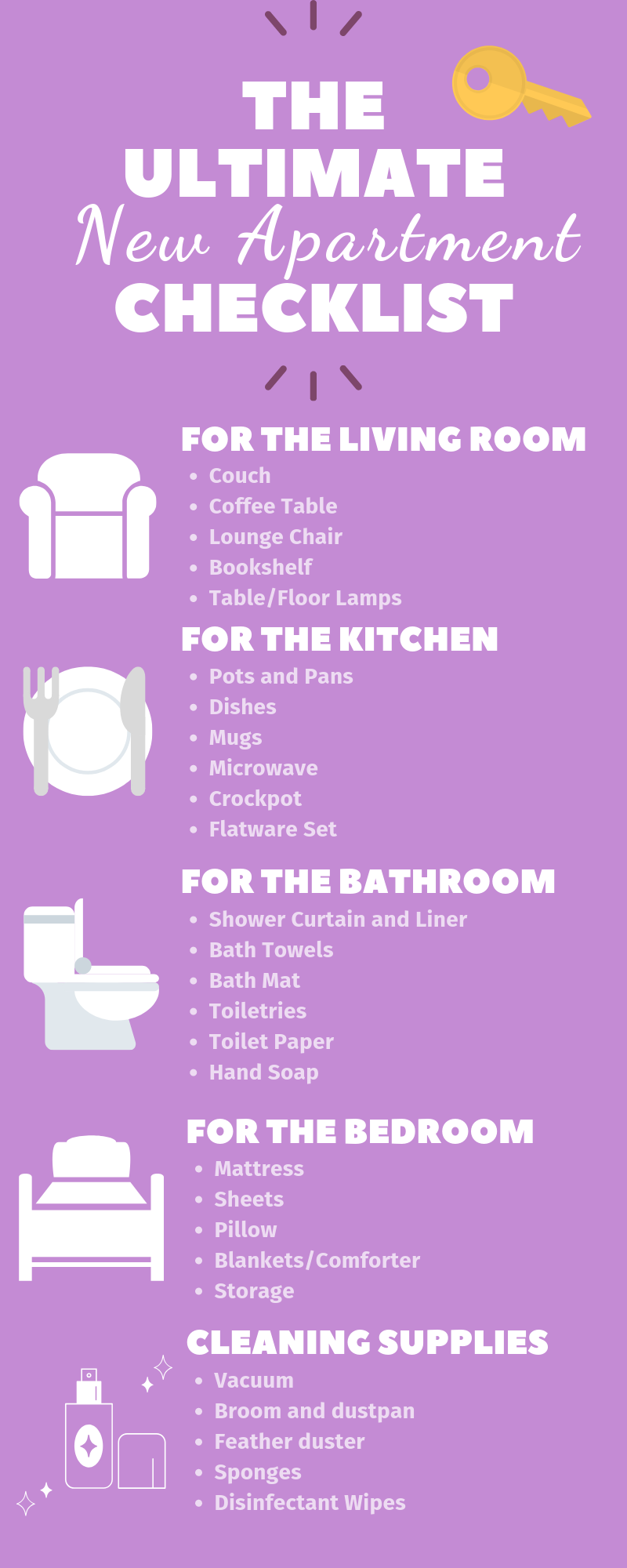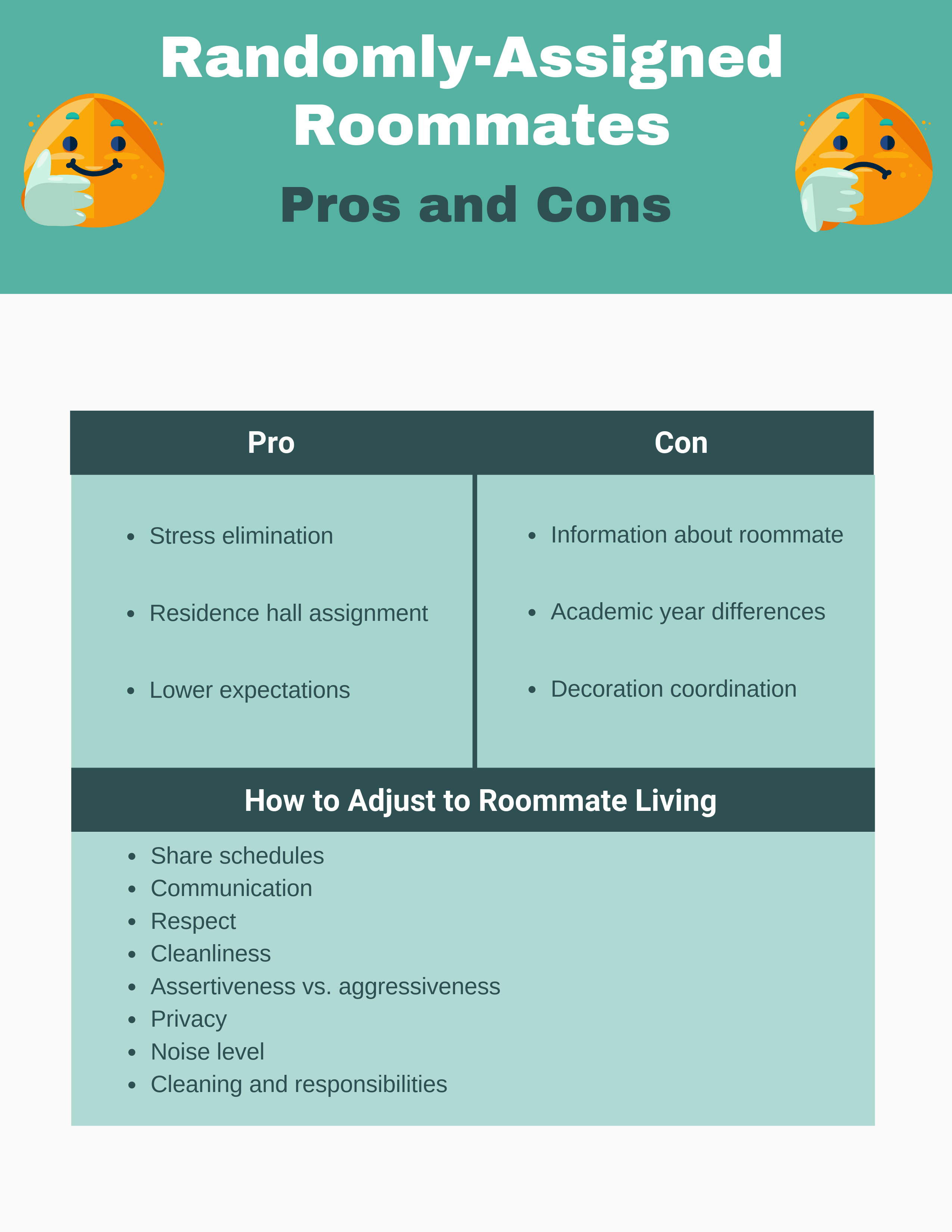College Roommate Tips
Combining Your Roommate's Style With Your Own
When you move out for the first time, you will soon realize that living on your own is very expensive. One of the quickest ways to cut living expenses is to add at least one roommate so that the amount of money you pay is cut by half. There is plenty that can go right with having a roommate: less expensive rent, an extra person to keep watch over the apartment when you are gone, and good company. There is also plenty that can go wrong, like clashing personalities or living styles. Lucky for you, there are also steps you can take to minimize the amount of clashing that takes place between one of your roommates.
Conflict can often break out when it comes to decorating your living space when you and your roommates have different styles. Instead of letting the issue create a rift between you and your roommate, try some out some of the following tips to help you and your roommate out when combining your roommate's style with your own.

Discuss your "must-haves"
When you have a different style than your roommate and you need to start combining your roommate's style with your own, it is easier to view it as a negotiation. Just like any negotiation, start it out by defining what each roommate really wants (and really doesn't want) at the end of the process. It is a bit more complicated when it comes to decorating your living space, as each person's "must-haves" can be the things that clash the most when it comes to style. Despite their name, "must-haves" do not necessarily have to be things that have to end up in your shared space, but can act as great starting parts when it comes to combining your roommate's style with your own.
For example, one roommate may like an extremely bright space with lights in every corner and everything with light colors to make space look a lot brighter than it actually is. However, you may like a more dim approach to make your living space look more cozy and comfortable. Those are two very opposing styles, but rather than rule one out in favor of the other, combine them. Rather than putting lights everywhere or holding back the lighting, try finding a middle ground where both of you are happy. Different sources of light and various ways of controlling natural light can be plenty of help. Instead of putting lamps everywhere and getting sheer curtains to let as much natural light in as possible, try getting lighting options that offer different levels of light. Light bulbs with dimming options or yellow versus white light can help control how bright a room can get and help both of you feel comfortable in your space.
Break up space for individual style
Sometimes styles will clash and rather than stopping the clashing of styles, embrace them by placing each style in your living style. Break down the living space that you are working with each space as something you can work on as an individual space. If you are working on decorating your room, designate parts of the space to each person. Try grouping each person's belongings, like one half of the room holds your bed, desk, and other belongings and the other half holds your roommate's belongings. Each person should be able to decorate their half as they please.
Think of them as two separate rooms, if it is harder for you to do so visually, try physically breaking up space. Get a room divider or two to make clear divides between the different sides of the room and styles. Or, instead of a room divider, choose a piece of furniture that you both can use to make the "room divider" more functional. Try out a bookcase - it can serve as the place marker where you and your roommate's sides meet, and also serve as a place where you can store belongings and decor.
Start small when combing styles
Shared spaces like living rooms, dining rooms, kitchens, and bathrooms are going to be harder as they are the rooms where everyone has an equal right to the space. Rather than going all-in on one person's style like you may have done with individual sides of a shared room, try placing touches of each person's style into shared spaces to make each person feel like their style is represented in the shared spaces.
There are various ways to incorporate different styles in small ways: decorate pillows, rugs, potted plants, tapestries, art prints, and so much more. These "small touches" can contribute to the living space looking a lot more lived-in and cozy. Combining multiple styles does not have to have visually clashing decor when you limit representative styles to smaller touches throughout a shared space.
Combining your roommate's style with your own does not have to result with you being unhappy in your space. As long as you put effort into making sure each person feels represented in your living space, you both can enjoy a space that reflects the both of you and makes you feel comfortable to call home.
Fun Activities To Do With Your Roommate This Semester
A new semester is here. Whether this means getting a new roommate or being with the same roommate as before, there are a ton of activities this semester that you can do together on campus. These can help you get to know your new roommate or bond even more with a roommate you had before.

Go to an athletic event
For some colleges, football is life. For others, they may be more known for sports such as baseball or hockey. Either way, going to a sporting event with your roommate is a great way to relax while bonding. Even if you are not a big fan of the sport, or of sports in general, your roommate may be. It is also fun cheering your school on against the competitor.
Catch a movie
Some colleges have their own theaters where they play previously released movies at discounted prices. Even if your college does not have this, you can find a nearby movie theater to see a movie at. Make a night of it and grab dinner before or after the movie. Find a movie that you both want to see, or make it a monthly outing and alternate who chooses the movie so that you each get a chance to pick.
Plan a fun night in
Pick a day each week that you can have a night in to spend with your roommate. Whether you have a spa night or just have some wine and watch a movie, staying in can help you bond closer while saving money. You can also invite friends so that your friends can meet your roommate and their friends to help you get even closer.
Attend a campus lecture
If there is a lecture outside of class time, see if your roommate wants to go with you, especially if it is something that either one of you is interested in. Many times, you do not get a chance to take classes you are interested in that are outside of your major. Going to lectures allows you to explore your interests and gives you something to talk about with your roommate.
Join a club together
You and your roommate may have similar interests, so joining a student club or organization is a great way to bond while doing something you both love. If you have different interests, you can join something neutral, such as a service organization or Greek life. Either way, joining a club together is a great way to make new friends, boost your resume, and get to know each other even more.
Go shopping
Retail therapy is fun, especially if you and your roommate are both having a stressful semester. If you can afford it, go shopping with your roommate. Buy new outfits between seasons so that you are prepared. Even if you do not have a ton of money, it is fun to look around and see what new things are out. This gives you ideas for what people can get you for gift-giving occasions. You can also see what your roommate likes so you can get an idea for gifts for them.
Attend a paint night
Even if you are not a good painter, going to a paint night can be a lot of fun. During these events, an instructor walks you through how to paint a predetermined picture. Find a local paint night and sit down with your roommate to decide what painting you want to do. These events can be a fun way to get artwork for your dorm or apartment while making memories with your roommate. If your painting does not turn out as planned, you can laugh about it and remember the fun you had.
Study together
Chances are you both have a lot of classwork that needs to be done, which can cut into the time you spend with each other. They say misery likes company, so study together with your roommate. You may have a class that you are struggling with that your roommate is great at, and vice versa. Read over each other’s essays and check each other’s work. You may even have a class or two together, so be each other’s study buddy
Grab something to eat
Everyone loves food, so grab a bite to eat with your roommate. Whether you meet up for lunch or have one night a week where you set aside time to have dinner together, finding this time is crucial for bonding and making sure you are staying in touch on roommate issues. While going to a sit-down restaurant is nice, even ordering takeout or hitting up the popular spots on campus can be fun.
Spending time with your roommate is crucial for surviving the semester since you are living together. Even if you stay in, there are plenty of things you can do together.
The Ultimate New Apartment Checklist
Let’s face it guys, getting your first apartment is a big deal. Whether you are paying for it completely on your own or getting help from your parents, having a real place with a roommate or two is one of the first ways to officially categorize yourself as an adult. After all, whether you moved out of your parents’ house or moved out of a dorm, having an apartment is a completely different ballgame.
The responsibilities of living in an apartment are completely different than living at home or in a dorm. While being at home or in a dorm requires a certain amount of independence, having a place to yourself (even if you’re living with roommates) in an apartment requires more of you as there are a variety of things to manage.
Living in an apartment for the first time is a beautiful and eye-opening experience that comes with great freedom and great responsibility. When planning a move into an apartment for the first time, keeping track everything and determining what to have in your place can become overwhelming. If you are about to move into an apartment and need some help, this comprehensive guide will help you figure out everything you need from the living room to the kitchen!

What to Do Before Moving In:
Moving into a new apartment isn’t exclusively about the cost of rent or what your electric bill will be. There’s a lot to take into consideration as well as what to stay on top of. For one, create a budget detailing the costs of moving in, including deposits, moving costs, purchasing items for the apartment, etc. to give you an idea of what money you need. Additionally, here are a few more things to do to ensure your space is ready to move in!
○ Change the locks
○ Check for bugs and rodents/call an exterminator: Before you do all the work to move in furniture, be sure to check for creepy crawlers and rodents. You don’t want to have to go through the hassle of moving everything again if an exterminator needs to come out!
○ Design the layout of your space: Measure the square footage of the area and try to come up with a general idea of where you think your furniture will go. This will make things a lot easier and less overwhelming once you start the physical part of the move.
○ Get your multi-plugs figured out: A blogpost by Unpackt notes the importance of this, writing to, "attach multi-plugs to power outlets in the areas you will need them before your stuff gets in the way."
○ Clean, Clean, Clean!
When You Move In
Now that your move-in day has come and the process is happening, it's easy to get lost in the chaos of unpacking and figuring out what to do with all of the stuff you’ve accumulated. Before you dump out all of your boxes and plop of the couch to take a power nap, there are a few things that can make your life easier!
○ Document Your Space: Before you fill up the apartment with your items, be sure to document the condition of the space first. Adrienne Breaux of Apartment Therapy writes, “If your landlord has asked you to fill out a condition report, do it as soon as you’re able to, and follow their instructions on whether you’re to drop it off to them or send a digital file, and include photos if you can. Also, make plenty of notes and photos to keep yourself.”
○ Put your boxes in their corresponding rooms
○ Introduce yourself to neighbors
○ Work on one room at a time
Furniture
When moving into your first apartment, you may be compelled to want to get the best furniture that’s out there. Luxury style couches, recliners, and other nice furniture may come across your mind as things you need to have in order to have a nice apartment- but that couldn’t be further from the truth! You don’t have to spend a fortune on furniture for your apartment to be both stylish and comfortable. Rather, you can save a lot of your money and make the process of getting furniture a lot smoother in the process.
There are a few ways you can get furniture on a budget, like getting older and unwanted items from friends or family, for instance! A lot of times, people like to get rid of furniture they have been holding onto for years, and this is a perfect opportunity for you to see if there’s anything you could possibly use! Couches, chairs, tables, desks, dressers, bed frames, etc. that people get rid of are all things that you could use in your new place. Additionally, getting used furniture at a store like Goodwill or even at a local yard sale is a great option because the prices are cheap and affordable.
For the Living Room
The living room is perhaps one of the most important, if not the most important, areas of your apartment. It is the common area where you will most likely spend most of your time or where your guests will congregate when you’re hosting a party. If you’re moving into an apartment on your own for the first time, you definitely won’t have loads of money to spend on an expensive coffee table or luxury wrap-around couch, and that’s ok! As stated earlier, you don’t have to splurge for your place to look nice and put together, all it takes are the right items that can make for the right feng shui. For your living room/area, these items can give you both functionality and balance.
● Couch: A necessary item for seating not only yourself but any guests who come over!
● Coffee Table: A coffee table is nice, but not necessary, to put small items like plants, the remote, or drinks on!
● Lounge Chair(s): When the couch is taken up, an extra lounge chair can help seat an extra person.
● Floor Lamp: If you have overhead lights, sometimes a floor lamp can provide more warm and cozy lighting!
● Table lamps: Similar to floor lamps, table lamps are both decorative and functional.
● Bookshelf: Are you a bookworm? Perhaps a collector of old VHS tapes? A bookshelf is perfect to not only have a place for these items but also to show them as well!
● TV, with stand or fixtures to hang on the wall: Not everyone has a TV in the living room, but it’s definitely great to have when you don’t feel like being in your bedroom or if you want to have a group movie night at your place.
● Desk and Chair: The open area of a living room is the perfect place for a mini-office set up with a desk and chair.
● Alternative seating: When you don’t have a lot of money to spend on chairs, alternative seating like bean bags or couch cushions can do the trick!

For the Kitchen
Some of us love to spend our lives in the kitchen, baking and cooking all kinds of recipes, while others stay as far away from the kitchen as possible. Whether or not you have a good relationship with your kitchen, you need it to serve a functional purpose in your home. Even if you eat ramen noodles every day, there are still basic, necessary items you need to have! You don’t need to have everything on this list, and you can continue to stock up and grow what you have in the future!
○ Pots and Pans: A large frying pan, a medium and a large pan are perfect for just starting out.
○ Dishes: No need to go crazy on dishes, a set of four (two plates, two bowls) is great.
○ Flatware Set: Include forks, spoons and butter knives.
○ Drinking Glasses: Four is fine!
○ Mug: For those days when you need a hot cup of tea or want to enjoy some coffee. I suggest having two or three!
○ Coffee Maker: How can us adults function without some coffee?
○ Crockpot: Not necessary, but it can come in handy for busy days/weeks in preparing meals that can last a few days! You can get a crockpot for less than $20 at Walmart.
○ Microwave
○ Measuring Cups and spoons
○ Cutting Board
○ Knife set
○ Cooking Utensils
○ Baking Sheet
○ Oven Safe Dish
○ Oven Mits
○ Dish Towels
○ Dish Drying Rack
○ Garbage Can
Remember that you don’t need to spend a ton of money on fancy, high-quality dishes or a set of pots and pans. Goodwill is an excellent option to get several of these items, as well as places like Walmart or Ikea!
For the Bathroom
Unlike the living room, you probably won’t be spending most of your time in your bathroom (at least, I hope not)! While your bathroom isn’t a highlight of your new apartment, you will definitely use it, as will guests, so it's important to have some essentials for both functionality and comfortability. You don’t have to get all of these items right away, but its good to have a guide to evaluate what you need now versus what can wait!
○ Shower curtain and liner
○ Bath mat
○ Bath Towels
○ Hand towels
○ Hand soap
○ Trash can
○ Plunger, toilet brush, toilet cleaner
○ Mirror
○ Storage containers
○ Toilet Paper
○ Toothbrush/toothbrush holder
○ Toiletries (deodorant, hairbrush, perfume, face/body wash, etc.)
For the Bedroom
The bedroom is the space you can call your own at the end of the day when you’re settled after work or when everyone leaves after a weekend party. It’s your own little getaway, so it's important to have the essentials, but also indulge a little bit if you can.
○ Mattress: Like I said, if you can indulge a little bit, go ahead and get yourself a comfortable mattress because sleep is a coveted necessity in adult life. If you have a tight budget, a futon or an air mattress is cool too!
○ Sheets
○ Pillow
○ Comforter/Blankets
○ Lamp
○ Storage, such as a dresser, under the bed containers, or plastic organizers
○ Hangers
○ Hamper
○ Trash can
○ Mirror
○ Nightstand
Cleaning Supplies
As much as some of us wish we could avoid it, cleaning your apartment is necessary for your health and cleanliness. Some people like to go all out, scrub their floors every day, spray the countertop every hour, etc., while others are a bit more laid back about the upkeep of their apartment. Regardless, you’re going to clean your space at some point, and in which case, you’ll need some supplies to help get the job done.
○ Vacuum
○ Broom and dustpan
○ Feather duster
○ A mop of some sort, the Swiffer Sweeper is great!
○ Disinfectant wipes
○ Laundry detergent
○ Sponges
○ Paper towels
○ Dish soap
○ Bathtub/tile cleaner
○ Rubber gloves
○ Trash bags
Miscellaneous
Yes, there’s a category in this list for stuff that doesn’t have a designated space. Sometimes there are little things here and there that aren’t super important, but you know you’ll be lost without them.
● Flashlight
● Batteries
● First aid kit
● Extension cords
● Light bulbs
● Lighter
● Pen, paper, to-do list
● Phone Chargers
● Electronics chargers
● Internet Plan
Food
When moving into your apartment, the first thing on your mind is usually getting all of your furniture and necessities into the place, like couches and bedroom sets, tables and lamps, etc. But once all of that is done, you don’t want to be left with no food in your apartment and an empty kitchen! Though it seems obvious, it can be easy to forget that you need to stock up on food to have in your apartment as well as with everything else! Here are some items you need:
● Rice
● Bread
● Flour
● Sugar
● Coffee/Tea
● Cereal
● Oatmeal
● Pasta
● Nut Butter
● Condiments like ketchup, mustard, mayonnaise
● Cooking Oil
● Butter
● Canned vegetables
● Canned fruit
● Pasta sauce
● Spices like salt, pepper, etc.
● Snacks like chips, cookies, etc.
● Milk
● Cheese
● Eggs
Living in an apartment with a roommate for the first time takes a great deal of responsibility, but you also get to learn a lot about yourself along the way. Though they may seem silly now, you will look back at this whole experience, especially all of your “firsts” and remember how well you did on your own for the first time and the great memories that came from them. During the move-in process, remember to ask for help when you need it and coordinate with your roommate, using this checklist as a guide to help you along the way. As always, good luck!

How to Coordinate Furniture and Décor with Roommates
It’s exciting moving into a new place with roommates, especially when it comes to decorating your new home. Not only do you have more options for décor and furniture to choose from, but you also get to plan out the vibe your space will give off with your roommates. Before moving into your new apartment, it’s important to get together with your roommates and coordinate what you already have, what you need to get, and how you will decorate your new home.

Pick a Theme
The first thing you and your roommates should do to coordinate furniture and décor is to pick a theme for the common areas. It’s best to pick a neutral palette so it is easy to find furniture and decorations that will all go together. You can choose to add a splash of color here and there to pull the room together.
A theme doesn’t always have to be a color palette, though. You can choose to have an actual theme such as your school’s mascot and logo or a shared topic you and your roommates absolutely love. This allows you to get creative and have fun decorating your new home.
Make a Checklist
To stay organized while coordinating furniture and décor with roommates, it’s helpful to have a checklist of who is bringing what items. The best way to coordinate is through Google Drive or another cloud-based program so you and your roommates can update the checklist in real-time and you will all be on the same page.
Creating a checklist will also keep you and your roommates from bringing duplicates of items, such as area rugs, televisions, coffee tables, etc. With a checklist, you’ll be organized and know exactly who is bringing what.
Be Flexible
Living with roommates can mean you have to compromise a lot. It’s important to go into coordinating furniture and décor with an open mind when it comes to working with your roommates. You may have a completely different vision than your roommates. Sit down with your roommates and talk about how you envision your new home looking. Listen to what they have to say as well and work together to create a vision that everyone approves of.
Sometimes, you may have to give in to certain things that you do not approve of. However, to keep the peace and a good relationship with your roommates, it’s worth it.
Go Shopping Together
If you and your roommates live near each other, spend a weekend going shopping for items for your new apartment. This will help you get excited for moving into your new home and you can talk about the items with your roommate before purchasing them.
If you do not live in the same area, create wish lists on Amazon or add links to your checklist. This allows you and your roommates to have input on what is being purchased for the apartment.
Set a Budget
It’s important to set a budget when it comes to buying furniture and decorations for your apartment. It’s easy to get carried away with buying things that catch your eye. If you are on a tight budget, don’t be afraid to ask family members if they have any furniture they are looking to get rid of. While it may not be the most attractive pieces, you can always find ways to make them match your desired theme. For example, buying a couch cover is much more affordable than buying a brand-new couch.
When purchasing items for the apartment with your roommates, make sure to talk about who will have it when you all move out. Sometimes it is easier for someone to buy one item and the other person to buy another item so that it does not get complicated when it’s time to move.
Make the Space Comfortable
The one thing that makes a house feel like home is comfort. You don’t want to create a space where you and your roommates feel uncomfortable, whether it’s the furniture or atmosphere. So, work together with your roommates to make your new home comfortable for everyone. Since you will be living there for quite some time, you will want to be able to walk into your house and feel relaxed and comfortable.
Coordinating Furniture and Décor with Roommates
Coordinating furniture and décor may be the ultimate test when it comes to living with roommates. Create a space that is comfortable for everyone and work together to decorate it by going shopping together and creating checklists to stay organized. You’ll have to plan out who is bringing which items, talk about themes, and make inevitable compromises. Just remember that no piece of furniture is worth fighting over and ruining your relationship with your roommates so early on into your lease.
Before and After Feelings About Your Freshman Year Roommate
Another academic year has come and gone, and with that often comes reflections of all that transpired. Particularly if you’ve just finished your freshman year of college, you’re probably looking back on everything that happened this past year, comparing your feelings and first impressions to your current feelings on the classes you took, the friends you made, and even your roommate.
After all, your freshman year roommate is someone special in many regards. Even if you won’t be rooming with the same person come next fall, there are some things you can’t help but reminisce over now that freshman year has come to a close. Read on for some before and after feelings that you may have experienced at some point relating to your freshman year roommate.

Before: You can learn everything about your roommate on social media before you meet them in person. After all, their pictures and announcements of what they’ve done in the past do a pretty good job of showing who they are, right?
After: By the end of the year (and hopefully well before it), you’ll realize that social media doesn’t paint a complete picture of who your roommate truly is. If you take the chance to get to know them, you’ll discover that your roommate is so much more than just their photos on Instagram or the posts they wrote on Twitter several years ago.
Before: There won’t be any conflicts or disagreements between the two of you.
After: You may end up getting along perfectly fine with your roommate, but there are still bound to be some bumps in the road. Maybe you two have drastically different schedules and sleep habits, which can potentially lead to conflict (e.g. if one of you consistently stays up until 3 a.m. while the other person is trying to get some shut-eye). Or perhaps one of you prefers listening to music while studying, and the other person can’t stand it. Thankfully, those minor disagreements can turn into valuable lessons that help you and your roommate figure out how to compromise. By the end of the year, you can hopefully look back on the dynamic between you and your roommate and realize that you were able to turn potential conflict into opportunities for growth and communication.
Before: Getting along with your roommate will be a piece of cake.
After: In some situations, this may be true, especially if you and your roommate happen to click as soon as you meet each other. However, as with most interactions and relationships, getting along well with your roommate requires showing respect and sometimes compromising. It’s always important to listen to your roommate, be honest with him or her, and treat him or her with respect.
Before: Your roommate will be your best friend, and the two of you will stay up late having deep conversations about life, binge on Netflix and ice cream together, and share clothes all the time.
After: Your roommate, quite simply, may or may not be your best friend at the end of the year. It’s easy to go into college thinking that the person you’ll be living with will be your closest companion, but only time and circumstances can tell. In many cases, you and your roommate would probably get along reasonably well and even spend time hanging out and bonding, at least in the beginning. You may end up becoming friends, but not the closest of friends. In some cases, the two of you might not even get along very well. And, in other cases, you may actually become best friends. The beauty of looking at the year in retrospect is that you can look back on the development of your relationship with your roommate and appreciate it for how it turned out, regardless.
Before: You may expect that your roommate will be very similar to you, whether culturally, economically, socially, etc.
After: Your roommate could very well be similar to you in all those ways, and perhaps the likelihood of such similarities is greater depending on the location and type of college you attend. However, in some circumstances, your roommate could turn out to be very different from you or from what you expect. Maybe they are a different ethnicity than you and come from a cultural background that you consider foreign. They could have a different sexual orientation. Or they might even have been raised with a different background and values. Whatever it is, this is a chance to embrace and celebrate your roommate’s differences by accepting them and taking the opportunity to learn more about them.
No matter how you feel about your freshman year roommate then and now, remember that the time you do or don’t spend with them is a chance for growth in many ways.
Mistakes to Avoid When Transitioning from Living at Home to Living With Roommates
Living at home with your family is one thing, and living with a roommate is another. Both have their pros and cons, but they are undoubtedly different. For many people, when they start college, they make the transition from living at home to living with a roommate. This adjustment can be challenging since the roommate relationship requires much more communication. In this article, we will discuss the mistakes students make when transitioning from living at home to living with roommates. Read on to learn about these mistakes and how to make sure you don’t make them!
Not cleaning up after yourself
Messiness is one of the worst qualities a roommate can have. This is especially true if the messiness extends to the common areas and is not limited to their individual room, since they will then need to deal with your mess, too. When you live at home, you can ask a family member to help you clean up. But on the other hand, you are usually (not always!) on your own when it comes to cleaning up after yourself. Your roommate will not be pleased to come home to a stack of your dirty dishes in the sink, your things scattered around the floor, or crumbs on the living room couch. Your roommate will not be happy with you if you do not clean up after yourself, and this can easily escalate to big roommate conflicts.
Instead, get into the habit of cleaning up after yourself. A good rule of thumb is to leave “no trace behind”. Make sure your place, especially the common areas that you share with your roommate, shows no trace that you cooked in the kitchen, ate at the dinner table, or snacked on the couch (come on, we all like to eat snacks and watch TV!).
Another way to deal with messes in your shared apartment is to split chores evenly. If you and your roommate create a chore assignment system, neither of you will have the entire burden of keeping the place clean individually. You and your roommate should consider creating a “chore wheel” or “chore chart” since this will make sure the chores are divided evenly and it will help you keep track of who is responsible for cleaning what. It might sound cheesy, but it will definitely get the job done. If you need some inspiration, do a quick search on Google, Instagram, or Pinterest for templates.
In short, do not make the mistake of not cleaning up after yourself when you live with a roommate, as this will surely irritate them. Instead, ensure that your place is clean, especially in the common areas you share.
Disrespecting your roommate’s possessions
Another mistake someone might make when transitioning from living at home to living with roommates is not respecting their roommate’s possessions. When you live at home, it’s easy to share different things with your family members. For example, it’s easy to share food and kitchen supplies with your family when you live at home. On the other hand, roommates don’t share as much. If you are used to sharing things, you might need to adjust to keeping things separate.
As roommates, you both need to respect each other’s possessions. Of course, there are some general rules, such as using someone else’s things without their permission. But there are more specifics, too. What do these specifics look like? Well, that depends on the set of roommates. One person might be completely fine with sharing things like clothes but not kitchen items, while someone else might be okay with sharing their kitchen items but not their clothes. Because these preferences vary depending on the person, you should have a serious, sit down, conversation with your roommate. During this time, discuss which possessions you will be willing to share and which are off-limits. Also, discuss if there are conditions to borrowing things. For example, do you need to ask every time before you borrow something? Are you only allowed to borrow clothes if you return them washed? Should you return things exactly where and how you found them? This conversation will prevent any misconceptions or miscommunications concerning sharing things.
Clearly, it is important to respect your roommate’s possessions, and for her to respect yours.
…Including their food…
Just as I mentioned in the previous point, it is easier to share things when you live at home with your family. However, when you have a roommate, you could decide to not share as many things with them. One particular type of possession you should discuss sharing (or not sharing) with your roommate is food. Your roommate might be fine with sharing her things with you, but not her food, and vice versa, so it is important to have a discussion with her about this. When you sit down with your roommate to discuss sharing or not sharing your items, ask her specifically which food items you two will be willing to share and what items are off-limits. You should also discuss whether you two will label with your names the foods you will not be willing to share since this will help prevent confusion.
In addition to respecting your roommate’s possessions, you should also respect their food. The best way to do this is to always ask if you can share.
…Or their privacy
Along the same lines, roommates need to respect each other’s privacy. Yes, the space is yours and you are allowed to feel at home there, but it belongs just as much to your roommate. They also deserve to feel safe and at home. For this reason, you and your roommate need to give each other privacy and space. This could mean making sure you lock the door all the time, giving them time alone at the apartment (everyone enjoys having the space to themselves for a little while), and limiting the number of guests (and the amount of time they spend at the apartment). Doing these things will keep you and your roommate comfortable and safe in your place. Not respecting your roommate’s privacy is a big mistake.
Having too many expectations
When you live at home, you know what to expect. However, when you are transitioning to living with a roommate, you might not know what to expect. Your roommate relationship might be strained if you or your roommate have unmet expectations of each other. For example, if you expect your roommate to be a night owl like you are, you might be disappointed to discover they need you to keep the noise level down after 10 p.m., or if you learn they are a neat freak when you are not. Clearly, these unmet expectations can be damaging, so it’s best to avoid them. The best way to avoid unmet expectations is by communicating effectively, which brings us to our next point…
Not communicating effectively…
As we said before, the best way to avoid unmet expectations is by communicating openly and asking questions. Here are some things you should communicate effectively about, in order to avoid unmet expectations.
● Cleanliness- is your roommate a neat freak or messy? Or somewhere in between? It can be stressful if you two have different organizational preferences.
● Having guests over- does your roommate plan to have people over or not? How often? Will they stay overnight? If not, how long will they stay? Either way is fine, just make sure you two are on the same page about this, since disagreements in this area can cause huge problems.
● Daily schedules- are you a night owl or early bird? Will you need your roommate to keep the lights dimmed at night or keep their alarm quiet in the morning? If you and your roommate have conflicting schedules, you will need to coordinate and work things out, which is totally possible.
● Sharing items- as we discussed earlier in the article, it’s critical to discuss which items can be shared and which are off-limits. Be sure to also discuss if there are any conditions for borrowing an item (such as an item of clothing can be borrowed if it will be washed before it is returned). Be sure to discuss sharing food, too.
● Alone time in the apartment- again, everyone likes to have at least a little bit of alone time in their place. You can coordinate some time every week with your roommate for each of you to have even some alone time in the apartment. With this time, you can get some studying done.
● Significant others- how long are significant others allowed to stay in the apartment? Will they be allowed to stay overnight? For how many days? Will you want privacy when significant others are over? If significant others overstay their welcome by remaining the apartment for days on end, your roommate will likely have a problem. It’s also not fair to your roommate to have an extra person who doesn’t pay rent staying over for a long time.
When you ask your roommate these questions, you have a better idea of what to expect when you live together. This will prevent disappointments, unmet expectations, and potentially big problems.
Additionally, it would be a good idea to write down the answers to these questions and turn it into a roommate agreement. A roommate agreement is a contract with some rules where you and your roommate agree to abide by. Of course, it is best to do to this at the beginning of your time living together, but it will still work later on in the roommate relationship.
…Especially about finances
One thing we didn’t mention is finances. Along with everything in the list above, you and your roommate should definitely discuss finances. More specifically, how will you split the bills? Who will be responsible for what, financially? This is an area in which you and your roommate absolutely must be on the same page. It’s also good for you both to know when each bill is due and about how much each bill will cost, so each of you can produce the right amount of money at the right time (and avoid late fees!). At home, you might not need to discuss finances in such detail, but with a roommate, it is essential to come to a financial agreement.
Being passive-aggressive
If you do encounter an issue with your roommate, you might be tempted to be passive-aggressive rather than facing the issue head-on, in person. Rather than leave a sticky note on the bathroom mirror, talk to your roommate in person about the issue. Be sure to catch them when they are available, not right when they are about to head out the door for the day or are studying.
Being difficult
When you live with another person, you need to be flexible. There is always a give and take, so do not be difficult with your roommate. This does not mean you should be a doormat, but try your best to work with your roommate. For example, let them borrow something if they ask. Honor their request if they ask you to turn down your music. If you are difficult with your roommate, the relationship will not be good. It is important to be flexible with your roommate, because one day, they will need to be flexible with you.
In conclusion, it is definitely a transition to go from living at home to living with a roommate. Still, it is a doable change that you can adapt to. As a roommate, you need to learn to communicate well, manage your expectations of each other, and respect each other’s possessions (including food). Living at home and living with a roommate are both great, they simply have their differences that we need to adjust to. If you follow the tips listed in this post, you will be able to avoid the mistakes students make when making this change. I wish you the best of luck in your transition from living at home to living with a roommate.

Things You Can Expect from Living with a Roommate
Living with a roommate, whether it's in college or afterward, means there are certain things you can expect to happen in your daily life. When you first move in with someone (or more than one someone), you'll be ecstatic. You're saving money on rent, you have someone to keep you company, and you dream about "family dinner night" and taking turns cooking for each other. You spend your Saturday mornings washing your dishes and vacuuming the floors, taking in all the niceness that having your place means. But about six weeks in, you'll begin to notice things that you didn't notice before. Six weeks into living with roommates, you'll begin to realize that you might be better off living by yourself.

1. Your level of cleanliness isn't their level of cleanliness.
Sure, you talked about how often you would clean. You discussed the idea of a "chore chart," where you switch off tasks like taking out the trash and vacuuming the living room. Maybe you even discussed permanent jobs: "I'll always do the cooking if you always wash the dishes."
But after six weeks of living with each other, your chore chart stops working and one of you starts dedicating more time and energy to the cleanliness of your apartment than the other. Suddenly, you're coming home from work every day to a sink full of dishes (though the dishwasher is empty and located right next to the sink). Your Saturday mornings go by quickly because they're filled with taking out the trash, Swiffer-ing the floors, and dusting the bookshelves. You want to have people over later, so you're cleaning up every nook and cranny, stocking the fridge with drinks, and rewinding the shared Netflix account to your favorite episode of "Friends."
You might be excited to live with a roommate -- and you very well should be. But give it about six weeks, and then you'll start realizing you're much cleaner than the person you chose to live with.
2. Lifestyles can vary drastically.
You're the type that gets up on Saturday mornings and is instantly productive. You want all of your laundry to be done by noon, the dishes to be washed and put away, and by the time you get home from the grocery store, you want to have a mental list of your dinner plans for the week.
Maybe you thought you chose your new roommate strategically, but then you find out that your lifestyles couldn't be more opposite. You've moved in with someone who sleeps in on Saturdays, staying up late partying with friends on your patio. The smell of their activities creeps through the vents and you're fuming with anger that they're keeping you awake. You had a Saturday morning plan that was productive, but they're ruining it by keeping you up until all hours of the night.
When you move in with a roommate, you can expect that your lifestyles won't be the same. Here's hoping you've picked someone who lives somewhat close to the way you do.
3. You can expect the unexpected.
Before you know it, there will be uninvited guests crashing on your couch, friends coming over to do their laundry, and sob stories about "finding the cutest puppy ever on the side of the road so they just had to have it." Within just a few weeks, you're living with an additional person and another dog, with practically no warning.
Living with roommates means you have to be ready for the unexpected -- at all times. You don't have any control over the behaviors of others, only your own. Therefore, anything is possible.
4. Your styles will clash.
Your idea of a calming living room is greenery and earthy tones, while your roommates want to throw in the trashiest couch they can find and hang mismatching tapestries on the walls. You might think you've found the right people to live with... until it comes to decorating the common areas.
You'll have to make some sacrifices. You might get to decorate the living room, but you'll have to give up control of the dining and kitchen decor. Living with roommates means being flexible and letting go of all your "ideals."
5. Game nights you didn't plan on.
When you live with other people, there are simply things you just cannot control. You might come home from a long day at work/school, only to find your living room filled with people you don't know -- drinking and playing card games like they're going out of style. On evenings when you simply want to relax, you can expect quite the opposite if you live with roommates.
You can avoid this by discussing nights that are "off limits" when you first move in together. Maybe you have a night class on Tuesdays, so you have to get your best rest on Monday nights. Therefore, Mondays are off-limits for having people over to the apartment. It's simply a discussion you'll have to have.
However, just because you've had the conversation doesn't mean your roommates will respect it. Expect to come home to company and a completely filled living room on your hardest nights -- because surely, at some point, it'll happen.
6. Your food will be eaten and your detergent will be used.
Regardless of how many conversations you have about respecting each other's stuff, at some point during your time living together, one of your roommates is going to use your stuff - usually without asking. Sometimes they notify you after the fact: "Hey I hope you don't mind, but I used one of your Tide pods to do my laundry earlier because I forgot that I ran out."
You might even find yourself going back over the rules about respecting each other's belongings six months after living together. In fact, you might even find yourself locking your door when you leave the house, doing anything you can to keep your roommates out of your stuff.
No matter how well you think you "laid down the law" when you moved in together, your roommate(s) will use some of your stuff at some point.
Living with roommates is certainly not fun (after the first few weeks). Nothing seems to go according to plan and you start dying to live by yourself. By the time fall semester comes to a close, you'll be looking for one bedroom apartments to move into. Before you decide to move in with people while you're in college, be sure to consider what could happen while living with roommates.
How to Decide to Live With Your Best Friend or Not
Figuring out who to live with for the duration of your academic year can be tough. On one hand, you don’t want to jump right in to living with someone random, but you also don’t want to spend forever searching for someone and let time waste. One option to consider is living with your best friend if they are around and are looking for a roommate as well.
Having your best friend as your roommate sounds like a dream, and sometimes it can be! However, there are a few things to consider and discuss beforehand to avoid a World War III-type disaster. Are you looking for a roommate? Thinking about asking your best friend to be your roommate? Be sure to read these four things to discuss with your bestie before moving in together!

Things to Discuss Beforehand:
- Having Guests Over: One important thing to discuss with your BFF before diving into being roommates is how each other feels about having guests over. You may be on the conservative side and not prefer to have guests over more than once a week, with appropriate notice. Your best friend, on the other hand, might be more open about inviting people over and enjoy doing so spontaneously. This is important to discuss as it pertains to you and your potential roommate’s comfortability with privacy. Krista Diamond of StorageFront.com writes, “Figure out what works for both of you when it comes to having significant others over, hosting parties and inviting family members to crash when they’re in town.”
- Cleanliness: A major point of contention for roommates, best friends or not, is cleanliness. Everyone has different lifestyle choices and how they do things, and this doesn’t exclude cleaning. You and your best friend obviously don’t live together (yet) so there would be no way for you to know if you could tolerate their level of cleanliness. You might be more on the laidback side and don’t worry about a few dishes in the sick, while your best friend might be a clean freak. Establishing each others levels of cleanliness is super important in establishing whether or not you two should move in together.
- Sharing Items: Some people love sharing every aspect of their possessions, whether it be shampoo or a bag of Cheetos. Another important thing to discuss with your best friend before moving in together is how you both are in terms of sharing things. You might not care about sharing all of your things with your best friend, even down to a pillow off your bed or your leftover pizza. Your friend might be more possessive about their things, and there’s nothing wrong with that! However, you and your potential roommate should be aware of these things that could cause a problem sometime in the future.
- Budget: One super important element about living with someone is figuring out how to split up living expenses like rent/amenities/cable & internet. Taking on adult responsibilities and figuring out how to effectively split bills can be difficult but it will definitely save you any kind of money-related trouble in the future. If your bestie likes to splurge on grub hub every day and is forgetful about paying bills on time, that would be something important to discuss before moving in together. Likewise, if you have trouble balancing payments, you should talk to your potential roomie about this. Leslie Tayne of Credit.com notes, “A major key for keeping the peace is making sure bills are organized. Figure out when and how bills will be collected and split each month, how they will be paid, and who is responsible for paying what amount. While this may sound obvious, too many times roommates will wait until the last minute, causing stress, tension and possibly late bills.”
How to Keep the Peace:
- Communicate: You have probably heard about keeping the doors of communication open over and over again in your life, but I can promise you that this is incredibly important, not only in roommate relationships but in all relationships- especially with your best friend. No matter what, you want to make sure that you and your best friend are communicating effectively. There is nothing worse than having a problem with your roommate, aka your closest friend, and just letting their actions get under your skin. It is infinitely more beneficial to confront your roommate with your problems than let the tension build for no reason.
- Schedule a Roommie Date: You and your potential roommate were best friends prior to moving in together, and it should stay that way while you’re living together. Between endless papers, labs, extracurricular activities, and jobs it’s hard to maintain a strong social life in college without driving yourself crazy! It’s especially hard to find time to actually hang out with your roommate because you’re so used to seeing them all the time. As a way to keep the vibes good in your living situation and stay close with your bestie, set up a day or night for you two to hang out.

Image via Pexels
Moving in with your best friend can be a blessing or a curse. Depending on how well you two get along and how well your lifestyle choices go together, you guys might thrive together or burn each other into the ground. Before moving in together, make sure to discuss important things like having guests over, cleanliness, sharing items an
The Pros & Cons of Getting a Randomly-Assigned College Roommate
By Amanda Cohen
Whether you’re a rising freshman, sophomore, junior, senior, and so on, you probably will encounter the following decision: choosing who to room with. There are so many different ways to go about deciding who you’re going to live with. You can shamelessly post a “get to know me” wall post in your university’s Facebook group, you can try to meet people during orientation (if you’re a freshman or transfer student), or you can choose to get randomly assigned a roommate.
I know it seems scary to leave your living situation in the hands of your university because it is scary, but it can also be pretty amazing to let your school handle it. However, I am going to try and see both sides of the situation by giving you the pros and cons of getting assigned a random college roommate. If you’re a rising freshman or a transfer student, make sure you pay close attention because this is most applicable to you since older college students already met people that they will want to room with. Read on if you want to make the decision as to whether or not you will get assigned a college roommate an easier and less stressful decision during an already tumultuous time.

Pro: You Eliminate the Stress of Having to Decide Between Roommates
Yes, making the decision of whether or not to have a random roommate is a hard decision, but it’s not as hard as having to choose between multiple roommate options that you meet online or during orientation. There are already so many decisions and emotions you have to work through when preparing to go to school, so why not eliminate choosing a roommate (or roommates) from the equation. If you are an already indecisive person (nothing to be ashamed of, I’m quite indecisive about many things), then leaving the fate of your roommate situation in your university’s hands instead of yours is the definition of ideal. I know plenty of people who have had success when being assigned a random roommate and they didn’t have to craft any funny posts on their social media!
Con: You Have Little to No Information About your New Roommate
Yes, this can happen with a roommate that you meet via. social media and/or orientation, but it’s much more likely to happen if your university matches you with a random roommate. Depending on the school you’re attending, you could get your roommate assignment on the early side or in August right before you move in. If you get your assignment on the later side, there is a good chance that you won’t get to know your roommate before you move in. Meeting a new roommate is awkward, especially during an already stressful time, so it’s not ideal that you will know little to nothing about your roommate’s life and personality until move-in day or right before. This can sometimes be a more stressful reality than having to choose your roommate yourself, but it really depends on your personality.
Pro: You Will Probably Get a Better Residence Hall Assignment
I can’t speak for every school, but at the University of Michigan, if you chose not to request a roommate, you were much more likely to stay off the dreaded North Campus (might as well be Antarctica). It may seem like no big deal, but requesting roommates is a hassle for the school because they have to plan everything to accommodate all of their incoming students, which can be in a number in the thousands! If you don’t request a roommate (and if much more people did not request a roommate), the school will be able to easily place you in a great residence hall without having to jump through any hoops or making ridiculous adjustments. Think about it this way: when you fill out your rooming application, you can request a roommate and usually pick your top three locations. The people in charge of making rooming decisions are much more likely to only accommodate one request and not two. So, if you request a better dorm room but not a roommate, you are more likely to get the dorm room. On the flip side, a person who requests a roommate and the better dorm room is more likely to just get their roommate of choice, not both their roommate and residence hall of choice.
Con: Your Roommate May Not Be in Your Same Academic Year
Even though this is fairly rare, it can still happen. Those who organize roommates and dorm room placements aren’t necessarily worried about if everyone is in the same year; their main focus is to ensure that everyone has a place to live. Yes, they want everyone to be happy, but with the number of people they have to place, it’s impossible to make everyone happy. If your randomly-assigned roommate is not in your same academic year, it can be hard to bond with him/her. If he/she is older, he/she may already have a group of friends and he/she definitely already knows the ropes and most of what you need to know about the university. If you’re younger/an incoming freshman, you won’t be able to commiserate with him/her nor bond with him/her, and this can make you feel quite isolated. In addition, you may have a harder time making friends your age because you and your roommate won’t have similar social schedules nor events, classes, nor activities in your calendars.

Pro: Just Because you Pick Someone, Doesn’t Mean You Will Get Along
Getting assigned a random roommate means that you will go in with lower expectations as to what your friendship/relationship status will be with him/her. If you choose who your roommate is, you will automatically make so many plans with this person about parties, scoping out your class locations together, decorating, and more. This may sound all well and good, but when you make these plans, you build up this expectation that you and your roommate who, even though you picked, you really don’t know that well, are going to be best friends. More often than not, you and your college roommate your freshman year will not be best friends, and making all these plans with him/her will only make you disappointed when it doesn’t pan out the way it does in all of the movies we see. If you don’t pick someone and you allow the university to make the decision for you, you go in with lower expectations, and your relationship with your new roommate will happen much more naturally. Remember, it’s not always the best situation living with someone who you consider to be your best friend, lowering expectations and living with someone who respects your space and vice versa is sometimes better.
Con: You Can’t Coordinate How to Decorate Your Dorm Room Together
If you meet someone via. Facebook, orientation, etc., you will have more time to discuss potential room layouts, decorations, how you’ll split up certain duties during move-in day, and more. The sooner you know who your roommate is and where you both will live, the sooner you can start ordering items that will fit in the designated space that you have in your shared shoebox (lol). I’m not saying that you have to match, but sometimes it’s fun to plan and coordinate with one another to give your room some sort of cohesiveness and so there aren’t too many clashing colors and/or patterns in your small space. You can discuss how you want to layout the room as well. For example, if you both want to loft your bed, if none of you want to loft your bed, or if one of you want to loft your bed and so on. The sooner these decisions are made, the less stressed out you’ll be, I have no doubt.
This list may not cover everything, but as someone who has gone through four years of undergrad and a semester of post-graduate school, I can tell you that it will definitely help you decide in regards to whether or not you choose to get assigned a random roommate or not. The bottom line is that regardless if you choose your roommate, get assigned a random roommate, live alone, live with more than one roommate, and so on, there is no guarantee of a “perfect” living situation. College is hard and living in a small space with one or more people can make it even harder. Since you already have an extensive pros and cons list, let me give you a small list on how to adjust to having a roommate and to living in a dorm room or small apartment or janky house:
● Set some ground rules so that when problems arise, you can always refer back to them
● Share your schedules with one another so you can respect one another’s sleep schedule, class schedule, activity schedule, and more
● Say out loud early on if something comes up and one of you is feeling bothered or frustrated, you talk to one another in a non-confrontational way
● Be as neat as possible; you don’t have to become a neat-freak, but even the tiniest amount of sloppiness can make a small dorm room feel a whole lot smaller
● Be courteous if you have friends over; try not to be too loud and maybe even ask your roommate if he/she is fine with you having people over or if he/she needs your living space to be quiet at a certain time
● Be transparent about how you like to keep your living space, how social you are, your sleep schedule, how loud you are, where you like to study, and so on
● If you have different intentions as to what it means to be a roommate (i.e. if one of you wants to be best friends and the other doesn’t), talk about it and figure out how you can make the situation work for both of you
● Avoid bottling everything up because, if you do, you are more likely to get yourself into a big fight; instead, talk about problems as they arise so you can be amicable, kind, and non-aggressive
● Be mindful of one another’s space and don’t borrow or take anything from your roommate without asking
● Divide cleaning responsibilities in terms of who will clean what and how you will split the price of cleaning supplies so that everything is equally distributed
● If you have multiple roommates, try and discuss with one another how to ensure no one feels left out or in the dark (this is especially important if there are three of you because one person is much more likely to be left out in this scenario)
If you have any more questions about how roommates are randomly assigned, your best bet in getting them answered quickly and correctly is by contacting your university directly. All schools are different, so a simple Google search probably won’t give you an accurate answer. In addition, talk to other people who are accepted to the school to see what their thoughts on and what their plans on; maybe these conversations will turn into roommate conversations, maybe they won’t, but at least you are trying to make connections early on so that, when you arrive on campus, you have a small support system somewhat in place and someone to go to the dining hall with.
If you’re feeling stressed, remember that it’s only June and you have times to sort your feelings out, start conversations, call your school, read more articles, and do your research. Whatever you decide, just make sure it’s a well-informed decision and not something that you decide on a whim because that’s more likely to stress you out. However, I will promise you this: whether you decide to choose your roommate or get randomly assigned a roommate, you can’t go wrong. I’m not saying it will be perfect, but remember that roommates can be changed if something isn’t right and nothing is permanent. You will figure it out!

Good luck, happy summer, and good luck with your roommate decision!
An Introvert's Guide To Living With A Roommate
For many students, college is seen as a kind of Valhalla. It is a place to be free and independent, to both make and find yourself, and to live as you have always wanted to. But there are some downsides to going to college (at least for some people), like having to move to or exist in a new location, having to create a new community, having a new schedule, and having to talk to and be around a lot of people. For some people, these aspects are also incredibly positive—they are indicative of a new adventure! But for other people, they can seem rather draining.
Living with a roommate can be difficult, no matter your personality type. But for introverts, having to live with a new, perhaps random, roommate can be especially difficult. Urban Dictionary defines an introvert as: “An introvert prefers to spend time alone in order to recharge their inner being. An introvert may appear to be shy to others, but that is not necessarily an accurate label. Being among groups of friends, family and even strangers can be wonderfully stimulating and joyous occasions. Interacting with people and attention to multiple sources of stimuli tends to draw down an introvert's energy causing them to eventually withdraw to spend time alone to re-energize. Small talk and pointless conversations tend to draw down an introvert's energy rapidly.”
Understanding what an introvert is can help delineate why it can be hard for introverts to live with a roommate. But understanding is half the battle and there are strategies any introvert can employ to make their living situation as smooth and stress free as possible. Read on for an introvert’s guide to living with a roommate!

Get To Know Your Roommate
If your roommate is either a randomly selected on or someone that you know (but maybe not that well), take the time to actually get to know them. The moving in process is rough, the first week of school is tough, the whole semester will be tough. It might be easy to keep pushing off getting to know your roommate until you are less stressed or busy because the getting to know someone process is already draining enough on its own.
But making getting to know your roommate a priority as soon as you move in will help to decrease stressful situations that could be caused later down the line if you do not. You do not have to be the best of friends and you certainly do not have to know everything about them or even talk to them all of the time. But you should be able to communicate openly and clearly with them. You should set a positive vibe and dynamic between you in the apartment. You should clearly decide, agree on, and lay out rules and guidelines to keep your cohabitation harmonious.
So get to know your roommate, even just a little. It will be a lot less stressful in the long run.
Separation of Space
As an introvert, you usually need time to yourself in order to recharge. So do not be afraid to create a separation of space between you and your roommate so that you know that you have a safe space to retreat to when you need it. You are not shutting your roommate out. Sometimes you just need a quiet, peaceful time and place to yourself.
Your room is often your best bet. Some people like to keep their bedroom doors open or to have their friends and roommates come hang out in their rooms. Maybe that will not be the best plan for you though. You can be friendly and sociable in the common spaces like the living room and kitchen. But you can make your room off limits so that you have a space that is solely yours and is not to be invaded.
Emerge From Your Room
When you do not know your roommate very well, it can be easier to just retreat into your room and not come out. That way you are at peace and can feel less drained. But the apartment is yours too and you should not have to give up your claim on it to feel at peace.
And even if your room is the place you need to recharge, it is not healthy to spend all of your time in it. Emerge from your warm cocoon of solitude and remember to embrace the world.
College is hard, but you can make it easier rather than harder if you are an introvert following this guide. Take care of yourself but be sure to try and push your own boundaries as well—finding a good balance while in college will help set the tone for the rest of your life.


